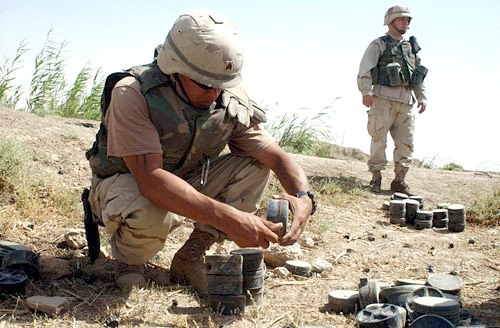Enhancing the army with neuroscience?
Interview with
Hannah - We've heard how neurochemicals can be used as weapons against the enemy, but can neuroscience be used to enhance the mental fortitude of soldiers and the fighting force on the ground. Professor Rod Flowers at Barts Medical School London chaired a Royal Society steering committee looking into this.
Rod - We identified some research for example which suggested it may be  used to screen, recruit, to identify those people who are say, for example are reacting under stress or have a particular cognitive skill set which at the moment has to be sort of teased out through quite intensive screening.
used to screen, recruit, to identify those people who are say, for example are reacting under stress or have a particular cognitive skill set which at the moment has to be sort of teased out through quite intensive screening.
We identified ways in which the cognitive performance of military personnel could be increased and one obvious example, I suppose, is the use of cognitive enhancing drugs. I mean, these have used for many, many years actually.
Even pilots in the Korean war used to use methamphetamines to prevent them from getting fatigued and keep them alert and awake. And of course, these days, we have much more sophisticated agents that enable you to do this. It's not just that, but also, having to have your troop sleep is actually a major problem in the field. So, if you could discover drugs that can keep your troops awake for a bit longer and enable them to perform competently then actually, this is a major advantage to you.
It might be possible to use EEG techniques on people who are observers. For example, people who are looking at lots of satellite images because it turns out that the brain often recognises differences between photographs and images, even if these differences don't make conscious awareness as it were. Picked up by measuring what's called P-wave in the brain. You can use this technique actually to speedup recognition for example of changes in satellite photographs of let's say, missile positions or something.
I suppose the other thing I could add is there's some evidence now that direct brain stimulation techniques may be used to improve speed learning. If you look on the web then see, you can build these things yourself from a 9 Volt battery and some wires and so on. I'm not recommending for any of your listeners actually to do that, but nonetheless, there have been some academic studies showing that brain stimulation does improve learning.
So, those were some of the handful of things that we found out that actually might improve the efficiency of armed forces.
Hannah - Thanks to Rod Flowers.
- Previous Honey trap
- Next Lending the healing body a helping hand










Comments
Add a comment